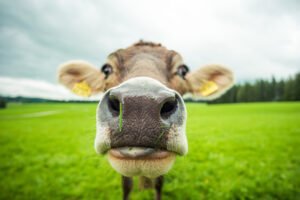Why is plant-based food good for the environment?
As a conscious hospitality professional looking to minimize environmental impact, you may have considered cutting back on your offering of animal products. The plant-based diet is one of the most effective methods to reduce your environmental footprint. WiseFins will discuss why plant-based food is good for the environment and what other benefits it can provide.
Overview
Before we dive into the specifics, let’s define what we mean by “plant-based food”. Plant-based foods are foods that come from plants, such as fruits, vegetables, grains, legumes, and nuts. These foods can be eaten or used as ingredients in recipes. Plant-based diets exclude all animal products, including meat, dairy, eggs, and fish.
To understand why plant-based food is good for the environment, it’s important to first understand the environmental issues that result from animal agriculture. Animal agriculture is responsible for land use, water usage, greenhouse gas emissions, and runoff pollution. We’ll discuss these impacts in more detail later on in this article.

Impacts of Animal Agriculture
The production of meat and dairy requires a significant amount of land. Not only does livestock need space to graze on, but farmland is also necessary for producing animal feed such as corn, soybeans, and hay. This increased demand for land has led to deforestation around the world – the World Wildlife Fund estimates that animal agriculture is responsible for nearly 80% of global deforestation, which is one of the most destructive practices when it comes to our natural environment. It has a variety of devastating effects on ecosystems such as biodiversity reduction as it destroys essential habitats for many species. Not only does this lead to imbalances in the food chain and disruption of nutrient cycles, but it also increases greenhouse gas emissions due to fewer trees being available for carbon sequestration. Furthermore, it leads to soil erosion and instability which cause floods or landslides.
Animal agriculture has a significant impact on water resources. For example, an estimated 13,600 liters of water are needed to produce one kilo of beef. This is incredibly inefficient and puts immense strain on global water sources. In comparison, plant-based foods such as legumes require far less water than meat and dairy products – making them much more sustainable options for the environment. Furthermore, producing feed for animal agriculture also requires large amounts of irrigation which can lead to overuse of groundwater streams and depletion of surface waters; this further highlights the need to reduce our reliance on animal-sourced food in favor of plant-based alternatives.
Animal agriculture is one of the most significant contributors to greenhouse gas emissions. Cows, sheep, and other livestock produce massive quantities of methane which significantly increases global temperatures. As demand for animal products continues to rise, it is likely that these emissions will also continue to increase. By destroying trees and soil to create farms and pastures, animal agriculture also indirectly contributes to climate change. This makes animal agriculture an incredibly destructive force on our environment and Earth’s climate system.
Animal agriculture can lead to a variety of environmental issues, such as runoff pollution. Excess nutrients from manure and fertilizers used for animal feed can cause algal blooms in waterways, which are toxic to both humans and wildlife. These pollutants can also contaminate soil and groundwater, leading to health risks.
Overuse of antibiotics on farms increases the likelihood that antibiotic-resistant disease strains will develop and be passed to humans. In some countries, approximately 80% of total consumption of medically important antibiotics is in the animal sector. In addition, by clearing forests for grazing land or factory farms, human populations come into closer contact with wild animals and their diseases, increasing the risk of transmission. The effects of animal agriculture are far-reaching – not only does it harm our environment but potentially our health as well.
Lastly, animal agriculture, particularly factory farming, is an ethically fraught issue. 99% of animal products come from factory farms, where animals are kept in cramped and uncomfortable conditions with limited access to exercise and sunlight. These environments have been linked to many welfare issues for the animals, such as poor hygiene, disease outbreaks, and even physical deformities due to overcrowding. This exploitation extends to the human workers, both on the farms and in meat packing factories: physical injury rates are often very high, due to the nature of the work and dangerous machinery. Psychological distress is common among workers in this field, due to long hours and difficult conditions. Unsanitary conditions can lead to further physical health problems for workers exposed to hazardous chemicals or unclean surfaces. Low wages mean that many struggle financially even with full-time jobs, while job security is also low as layoffs happen frequently when production slows down or costs need to be cut.

Overview of Plant-Based Diets
Plant-based diets refer to a way of eating that emphasizes whole, plant-based foods such as fruits, vegetables, whole grains, legumes, nuts, and seeds while minimizing or eliminating animal products. Plant-based diets have gained popularity over the years due to a variety of reasons, including environmental concerns, animal welfare, and health benefits.
There is nothing new about the concept of plant-based eating. Plant-based diets have been a part of human eating habits for centuries, with the vegetarianism practiced by Hindu and Buddhist communities dating back thousands of years. In India, where approximately 40% of the population follows a vegetarian diet, plant-based eating is deeply embedded in religious and cultural beliefs. Many Indian religions such as Hinduism, Jainism, and Sikhism encourage or mandate vegetarianism as a way of life. As a result, Indian cuisine offers a vast array of delicious and nutritious vegetarian and vegan options, including dal (lentil soup), chana masala (spiced chickpea curry), aloo gobi (potato and cauliflower curry), and baingan bharta (smoky eggplant mash).
Similarly, in Ethiopia, plant-based foods have been a staple of their cuisine for centuries. The country’s traditional dishes such as injera (a sourdough flatbread made from teff flour) and wat (a spicy stew made from lentils, beans, and vegetables) are typically vegan or vegetarian. Ethiopian cuisine has a unique and diverse range of flavors, and the country’s plant-based eating culture has played a crucial role in its food identity.
In Western countries, plant-based diets have been steadily gaining popularity. If vegetarianism was a relatively fringe lifestyle just a couple of decades ago, now most restaurants will offer a diversity of veggie and vegan options, big fast food chains have developed countless imitations, and in supermarkets, you have a wide range of plant-based milk, egg and meat alternatives to choose from. According to a 2020 report by research firm GlobalData, the number of people identifying as vegans in the US has increased by 600% in the last three years. Additionally, a 2019 study by Ipsos Retail Performance found that 39% of people in the UK were actively trying to reduce their meat consumption.
The increasing popularity of plant-based foods is also evident in the growth of the plant-based food industry. According to a report by The Good Food Institute, the plant-based food industry in the US alone grew by 27% in 2020, reaching a market value of $7 billion. This growth is expected to continue in the coming years as more people become aware of the benefits of plant-based diets and seek out plant-based food options.

Benefits of Plant-Based Foods
One of the most significant benefits of plant-based foods is that they require fewer resources than animal products. Compared to animal products, plant-based foods require less land and water to produce. For example, it takes around 13,600 liters of water to produce one kilo of beef, while it only takes about 800 liters of water to produce one kilo of soybeans. This significant difference in resource usage makes plant-based diets a much more sustainable option.
Plant-based foods require much less land to produce. For example, it takes about 20 times less land to produce a kilogram of protein from beans compared to beef. Additionally, a report by the World Wildlife Fund found that if everyone in the UK ate plant-based food one day a week, it would be equivalent to taking 16 million cars off the road in terms of greenhouse gas emissions. By choosing plant-based foods, we can help reduce the demand for animal products and the resources required to produce them, which can help preserve forests and other ecosystems.
Furthermore, a study published in the very famous scientific journal, Nature, found that if the world adopted a plant-based diet, it could reduce agricultural greenhouse gas emissions by up to 70% and reduce land use needed for food production by 75%. The study also found that plant-based diets could help alleviate pressure on water resources, reduce water pollution, and prevent the loss of biodiversity. These findings demonstrate the significant environmental benefits of choosing plant-based foods over animal products.Therefore, a plant-based diet can be an excellent choice for those looking to reduce their carbon footprint and help protect the planet.
Another benefit of plant-based foods is that they provide better possibilities for urban agriculture compared to animal products. Urban farms are becoming increasingly popular as a way to reduce food miles and provide fresh produce to city dwellers. However, most urban farms focus on producing fruits, vegetables, and herbs rather than raising livestock due to space constraints. Therefore, plant-based foods are often the preferred choice for urban agriculture.
Finally, plant-based foods have numerous health advantages over animal products. Recent studies have shown that plant-based diets can reduce the risk of chronic illnesses such as diabetes and heart disease. A diet rich in whole grains, fruits, vegetables, legumes, and nuts can provide all the nutrients needed for a healthy lifestyle while avoiding the saturated fats found in animal products. Moreover, plant-based diets are often higher in fiber, vitamins, and minerals, which are essential for good health.

Challenges
While plant-based diets have numerous benefits, there are also some challenges that people may face when adopting this type of diet. While plant-based foods can provide all the nutrients needed for a healthy diet, it can be more challenging to get enough of certain nutrients without consuming animal products. For example, while plant-based sources of protein such as beans, lentils, and tofu can be nutritious, they may provide less protein per serving than meat or dairy products. However, it should be remembered that humans usually consume more protein than the body needs. At a minimum, it is recommended for each person to consume 30 grams of protein at each meal. This target is a perfect amount to help steady blood sugar levels, dampen cravings, and support energy levels.
Another challenge of plant-based diets can be social and cultural pressures. In many societies, consuming meat is a deeply ingrained cultural practice and can be seen as a symbol of prosperity or status. As such, choosing a plant-based diet may be met with skepticism or disapproval from friends and family members.
Finally, some people may find plant-based diets more expensive than traditional diets, particularly if they rely on specialty or processed plant-based products. While plant-based diets can be affordable and economical, it may take some effort to relearn how to cook without animal products.
Overall, while there are some challenges associated with plant-based diets, these challenges can be overcome with education, planning, and a willingness to try new foods and cooking techniques.
Conclusion
For conscious shoppers looking to minimize their environmental impact, plant-based food is an excellent option to consider. Plant-based diets have numerous benefits for both our health and the environment. They require fewer resources to produce, have a lower impact on deforestation, and can reduce greenhouse gas emissions and other forms of environmental degradation. It’s a great way of getting all the nutrients needed for a healthy lifestyle while avoiding the saturated fats and other health risks associated with animal products. The rich history of vegetarian and vegan foods means that adopting a plant-based diet offers an opportunity to dive into world foods and expand your culinary horizons. While there may be some challenges associated with adopting a plant-based diet, these challenges can be overcome with education, planning, and a willingness to try new foods and cooking techniques. By choosing plant-based foods, we can make a positive impact on our health and the health of the planet, and move towards a more sustainable and compassionate future.
